What is Local SEO?
Local SEO (Search Engine Optimization) is a powerful marketing strategy that optimizes a business’s online presence to attract more local customers from relevant local searches. These searches typically occur on search engines like Google, Bing, or Yahoo, often including location-specific keywords like “near me” or the name of a city. By improving visibility in local search results, businesses can increase foot traffic, online traffic, and conversions.
Here’s a comprehensive exploration of Local SEO:
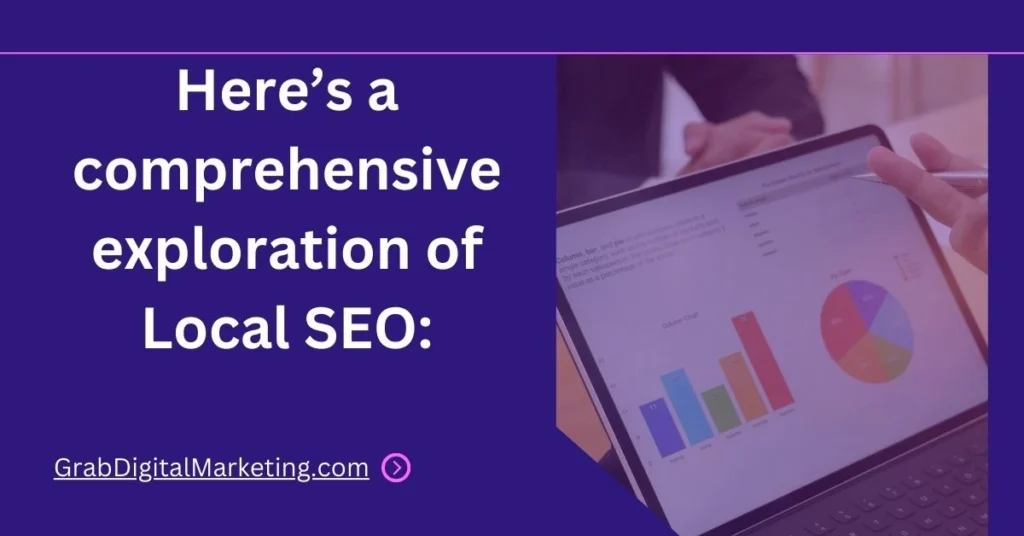
Local SEO (Search Engine Optimization) focuses on optimizing a business’s online presence to attract more customers from relevant local searches. It helps companies to appear in search results when potential customers look for products or services near them. Key strategies include optimizing Google Business Profile, using location-specific keywords, acquiring local backlinks, and ensuring accurate name, address, and phone number (NAP) details across directories. Customer reviews play a crucial role in building trust and influencing rankings. Mobile-friendliness and fast-loading websites also enhance local search visibility. Additionally, businesses should leverage localized content, participate in community events, and ensure their website has structured data (schema markup) to improve search engine understanding. Local SEO is vital for small businesses, brick-and-mortar stores, and service providers aiming to stand out against competitors.
Key Components of Local SEO
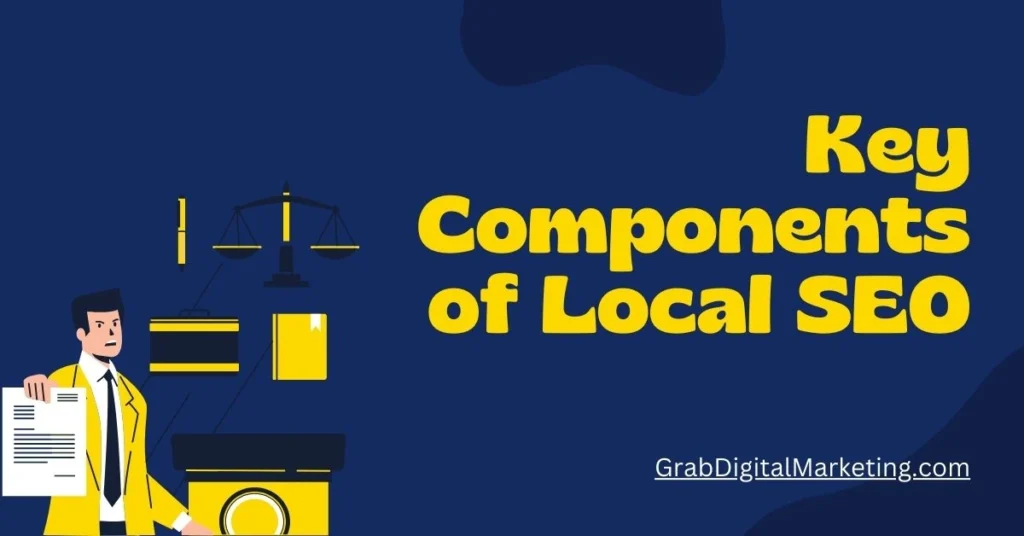
Google Business Profile Optimization (Formerly Google My Business)
- Claim and verify your Google Business Profile.
- Provide accurate and up-to-date business information such as name, address, phone number, hours of operation, website, and categories.
- Add high-quality photos and respond to customer reviews to improve engagement.
Local Citations

- Ensure your business is listed accurately on local directories like Yelp, Yellow Pages, and Bing Places.
- Consistency of Name, Address, and Phone Number (NAP) across all platforms is crucial for building trust with search engines.
Local citations refer to online mentions of a business’s name, address, and phone number (NAP) on websites, directories, and social platforms. They play a crucial role in local SEO by helping search engines verify a business’s legitimacy and improve its visibility in local search results. Common citation sources include Google Business Profile, Yelp, Yellow Pages, Facebook, and industry-specific directories. There are two types of local citations: structured (found in business directories) and unstructured (mentions within articles, blogs, or news websites). Consistency across citations is essential, as discrepancies can confuse search engines and potential customers, negatively impacting rankings. Accurate citations enhance credibility, boost local search rankings, and increase customer trust. Businesses can build citations manually or use automated services to ensure consistency. Regular monitoring and updates are necessary to maintain accuracy. Overall, local citations strengthen a brand’s online presence, improving search rankings and driving more local traffic.
Online Reviews

Online reviews are critical for businesses, influencing consumer trust, brand reputation, and search engine rankings. Reviews, whether on Google, Yelp, Trustpilot, or social media, serve as digital word-of-mouth, helping potential customers evaluate a business before purchasing. Positive reviews enhance credibility, improve local SEO, and increase conversion rates, while negative reviews can damage a brand’s reputation. Encouraging satisfied customers to leave reviews is a key strategy, but responding to both positive and negative feedback is equally important. Thoughtful engagement shows professionalism, builds customer relationships, and signals trustworthiness to search engines. Businesses should also monitor reviews regularly, addressing concerns promptly and maintaining transparency. Authentic, high-quality reviews help search engines assess credibility and relevance, boosting rankings. Fake or misleading reviews can harm a business’s reputation. Ultimately, a strong review management strategy fosters customer loyalty, strengthens brand presence, and drives more conversions in an increasingly competitive digital landscape.
On-Page Optimization

- Use location-specific keywords in page titles, meta descriptions, headers, and content.
- Create localized content, such as blog posts about local events or services tailored to local needs.
On-page optimization refers to improving individual web pages to boost search engine rankings and enhance user experience. It involves optimizing elements like title tags, meta descriptions, headings, and URL structure to ensure clarity and relevance. High-quality, keyword-rich content is essential, as it helps search engines understand the page’s topic while engaging visitors. Proper use of header tags (H1, H2, H3) improves readability and SEO structure. Internal linking strengthens website navigation and distributes page authority effectively. Image optimization—using alt text and compressed files—enhances accessibility and page speed. Mobile-friendliness and fast loading times are crucial for user retention and rankings. Schema markup provides search engines with additional context, improving click-through rates in search results. Regularly updating content and conducting SEO audits ensure ongoing optimization. Effective on-page strategies contribute to better rankings, higher traffic, and an overall stronger digital presence, making them indispensable for successful SEO campaigns.
Local Backlinks
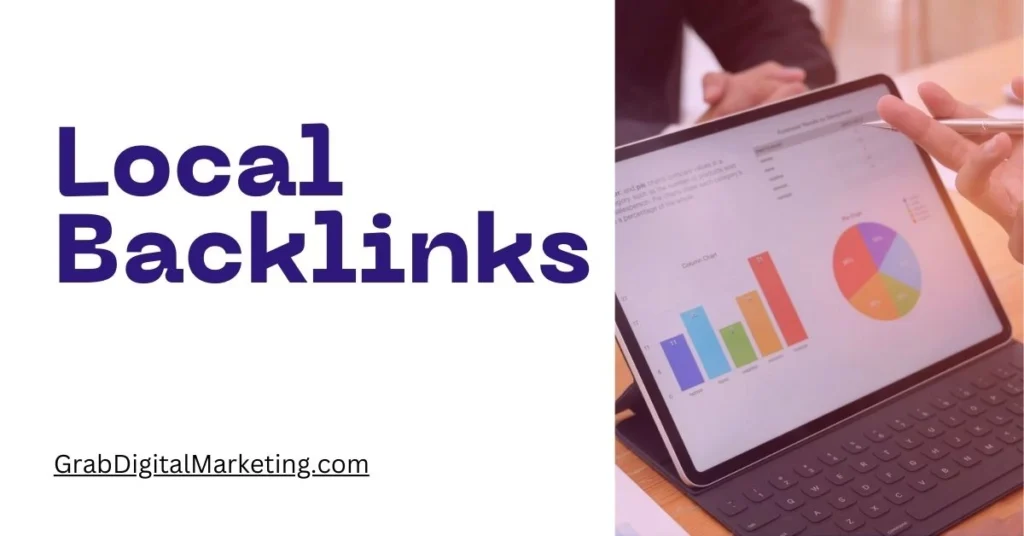
Local backlinks are links from websites within the same geographic area as a business. They play a significant role in local SEO by boosting domain authority, improving rankings, and increasing visibility in local searches. These backlinks come from local directories, businesses, newspapers, blogs, and community websites. Quality matters more than quantity—links from reputable sources enhance credibility. Businesses can earn local backlinks by partnering with nearby companies, sponsoring events, engaging in community activities, or submitting guest posts to local blogs. Press mentions and citations from trusted local sources further strengthen search rankings. Strategies like creating shareable local content and listing in location-based directories help attract valuable links. Consistency in NAP (name, address, phone) details ensures search engines recognize the business correctly. Ultimately, strong local backlink profiles enhance a company’s online presence, build authority, and drive more localized traffic, making them indispensable for local search optimization.
Localized Content

- Write about topics that resonate with your local audience, such as guides to your city or neighborhood events.
Localized content focuses on creating relevant, location-specific material that resonates with a local audience. It enhances local SEO, improves engagement, and helps businesses connect with nearby customers. This content can include city or neighborhood guides, local event coverage, case studies featuring local clients, and blog posts addressing community interests. Using geo-targeted keywords and references to landmarks or regional trends strengthens relevance. Incorporating customer testimonials and success stories from local clients builds trust and credibility. Businesses can also collaborate with local influencers or organizations to amplify reach and engagement. Localized content benefits businesses by positioning them as an integral part of the community. It improves search engine rankings, attracts nearby customers, and fosters loyalty. Regularly updating content to reflect seasonal changes, cultural events, and regional developments ensures sustained engagement. Ultimately, a strong localized content strategy creates meaningful connections while driving traffic and conversions in competitive local markets.
Schema Markup

Schema markup is a structured data vocabulary that helps search engines understand and display content more effectively. It enhances search results by providing rich snippets—additional details like ratings, event times, and product prices—improving visibility and click-through rates. Businesses use schema markup to highlight local information, including business hours, reviews, and addresses. Common types include local business schema, product schema, event schema, and FAQ schema. Implementing schema markup correctly improves local SEO by making listings more informative and relevant. Adding schema markup requires inserting specific JSON-LD code into a webpage’s HTML. Tools like Google’s Structured Data Markup Helper and Schema.org provide easy-to-use guidelines. Search engines use this data to enhance search results, helping users find relevant information faster. Properly implemented schema markup improves ranking potential, boosts organic traffic, and strengthens search presence.
Mobile Optimization
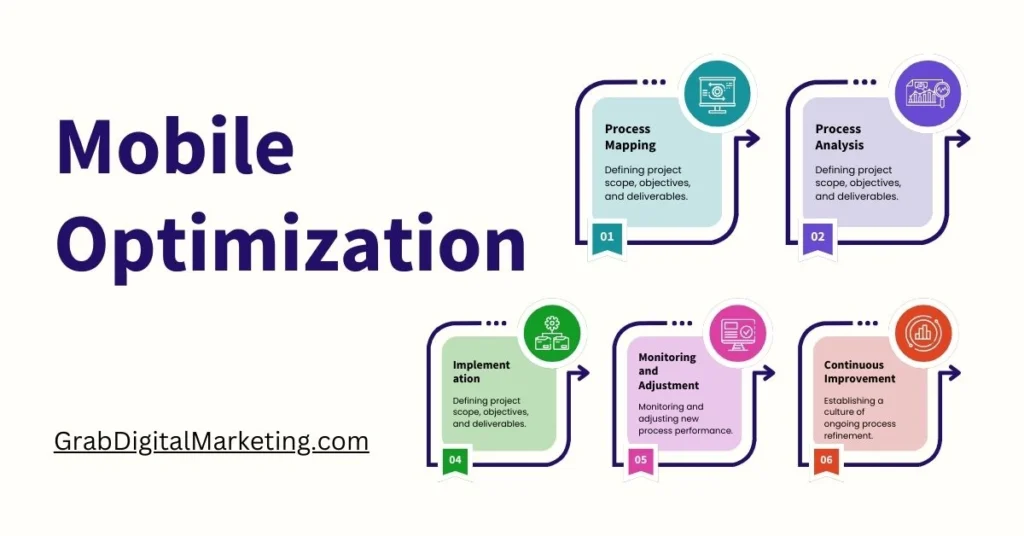
Mobile optimization ensures a website performs well on smartphones and tablets, providing a seamless user experience and improving search rankings. With most internet traffic coming from mobile devices, Google prioritizes mobile-friendly sites in its search algorithm. Key strategies include responsive design, which adapts layouts to different screen sizes, fast-loading pages achieved through image compression, minimized code, and efficient caching. Mobile-friendly navigation with clear menus and touch-friendly buttons enhances usability. Optimizing content readability with shorter paragraphs, larger fonts, and concise messaging improves engagement. Structured data (schema markup) helps search engines display relevant information, while AMP (Accelerated Mobile Pages) speeds up page loading. Mobile optimization also supports local SEO, as users frequently search for nearby businesses on mobile devices.
The Importance of Local SEO

Local SEO is critical for small and medium-sized businesses that rely on attracting customers from a specific area. Here are some reasons why it matters:
- Increased Visibility: Local SEO boosts your presence in local search results and maps, ensuring more potential customers find you.
- Higher Conversion Rates: Local searches often have high intent, as users are actively looking for products or services near them, leading to better conversion rates.
- Community Engagement: Optimizing for local SEO helps you engage with your local community and build trust with local customers.
- Competitive Advantage: Many businesses overlook Local SEO, so implementing it effectively can give you a competitive edge.
Challenges in Local SEO
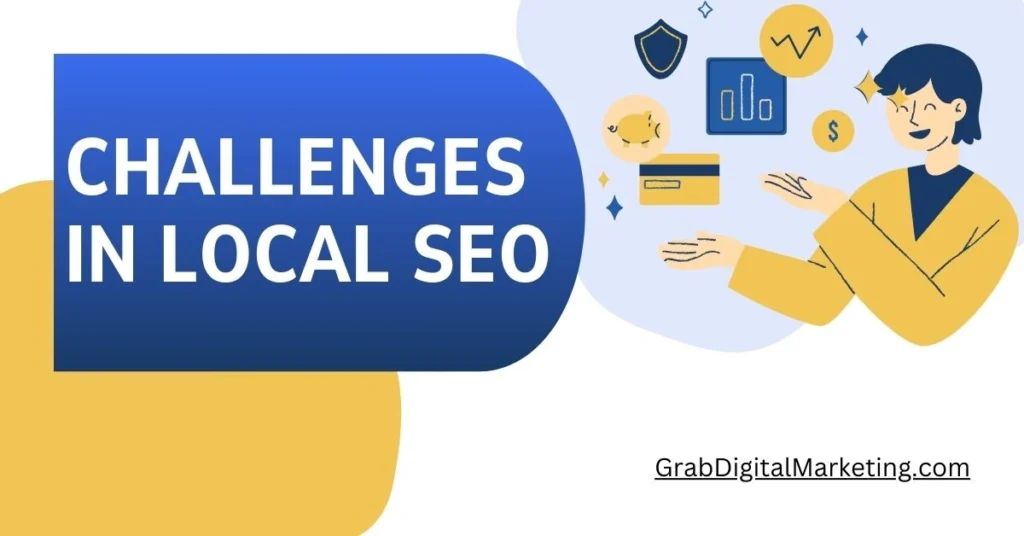
While Local SEO offers significant benefits, it also comes with challenges, including:
- Maintaining Consistency: Keeping NAP information consistent across multiple platforms can be time-consuming.
- Managing Reviews: Negative reviews can impact your reputation, and managing them requires a strategic approach.
- Algorithm Changes: Search engine algorithms evolve frequently, so staying updated is essential for maintaining rankings.
Tips for Success in Local SEO
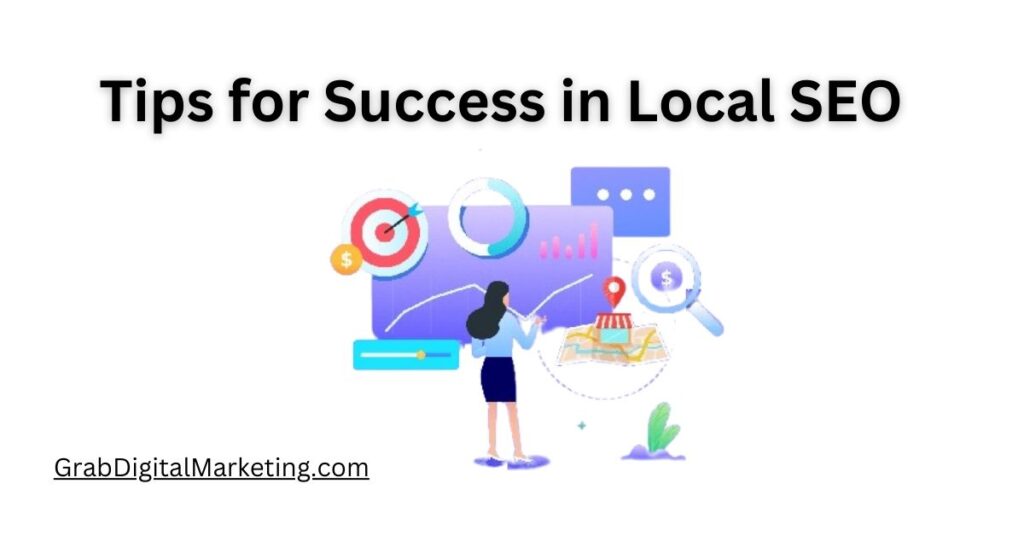
- Perform a local SEO audit to identify strengths and weaknesses.
- Use tools like Google Analytics and Google Search Console to track performance and traffic.
- Focus on voice search optimization, as many users search using voice commands.
- Leverage social media to engage with your local audience and share content.
Local SEO helps businesses attract nearby customers by improving visibility in local search results. To succeed, start by optimizing your Google Business Profile with accurate details, engaging photos, and regular updates. Ensure your website includes local keywords naturally, such as city or neighborhood names, to match what users are searching for. Getting listed in local directories and maintaining consistent business information across platforms builds credibility. Encourage customer reviews—positive feedback boosts trust and rankings. Mobile-friendliness is crucial, as many local searches happen on smartphones, so your site should be fast and easy to navigate. Lastly, leverage local content and social media to engage with the community and stay relevant in local conversations. These steps help businesses stand out, attract more local traffic, and drive meaningful connections with nearby customers.

